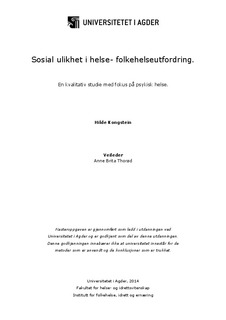| dc.description.abstract | Background: Social inequalities in health are a significant challenge in Norway. To meet
these challenges, we need research that can give us better insight and understanding so that
we have greater opportunity to prevent and take action. Researches are showing a relationship
between socioeconomic factors and mental health, it is therefore desirable to obtain empirical
data from people living with such experiences.
Purpose and key questions: The purpose of this study is to get insight and understanding of
how socioeconomic factors affect people with impaired mental health, capturing their
experience is central in this study. The key questions are: 1) How do individuals experience
that their reduced economic resources affect their mental health? 2) What gives meanings and
strength fore these individuals, and is there something that can be improved?
Method and selection: Qualitative research interview was used to collect data from five
participants. The participants are individuals who have or have had experience with impaired
mental health. They also have or have been active users of low-threshold centers for people
struggling with mental health problems in the southern region of Norway.
Results: Reduced economic resources is a factor that affects the individual’s mental health in
a negative grade, health exacerbation, insecurity, reduced autonomy and increased
psychological distress. Activity has a countervailing effect, it provides a meaningful existence
and improves or stabilizes the subjective experience of their own mental health. There are
indicators that says that information about offers that exist in the community happens by
coincidence.
Conclusion: Economy is experienced by the individuals as a crucial factor affecting their
mental health. The individual’s are experience a meaningful life with socializing and
fellowship when they are using the low-threshold center. Lack of information may possibly
lead to exclusion of potential users.
Keywords: mental health, social inequality, Kjell Underlid, Aron Antonovsky, economy,
activity. | nb_NO |
